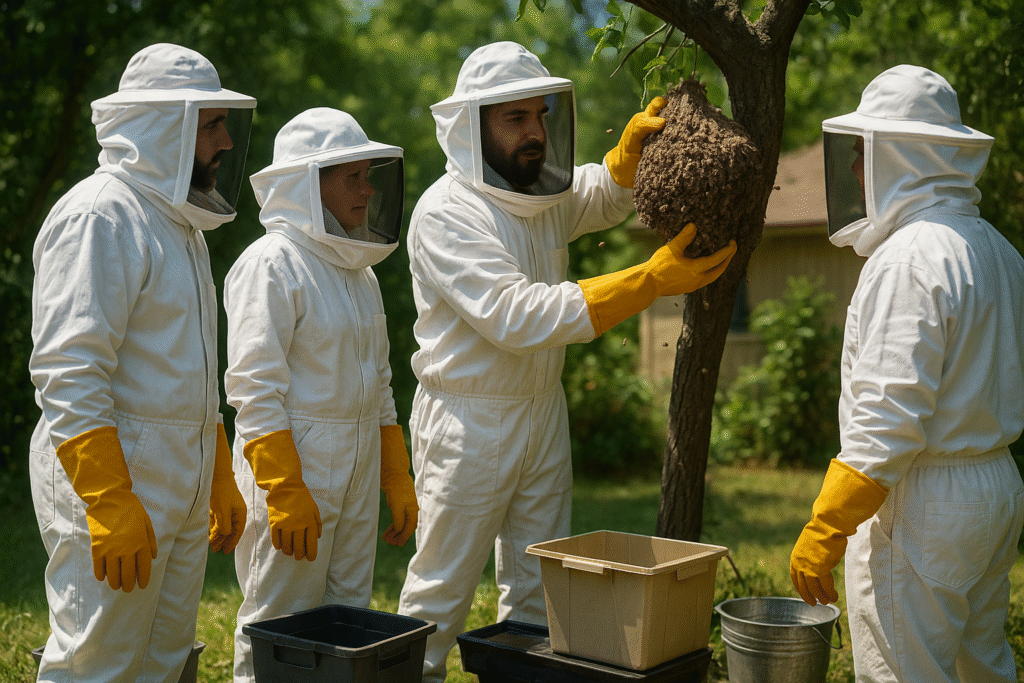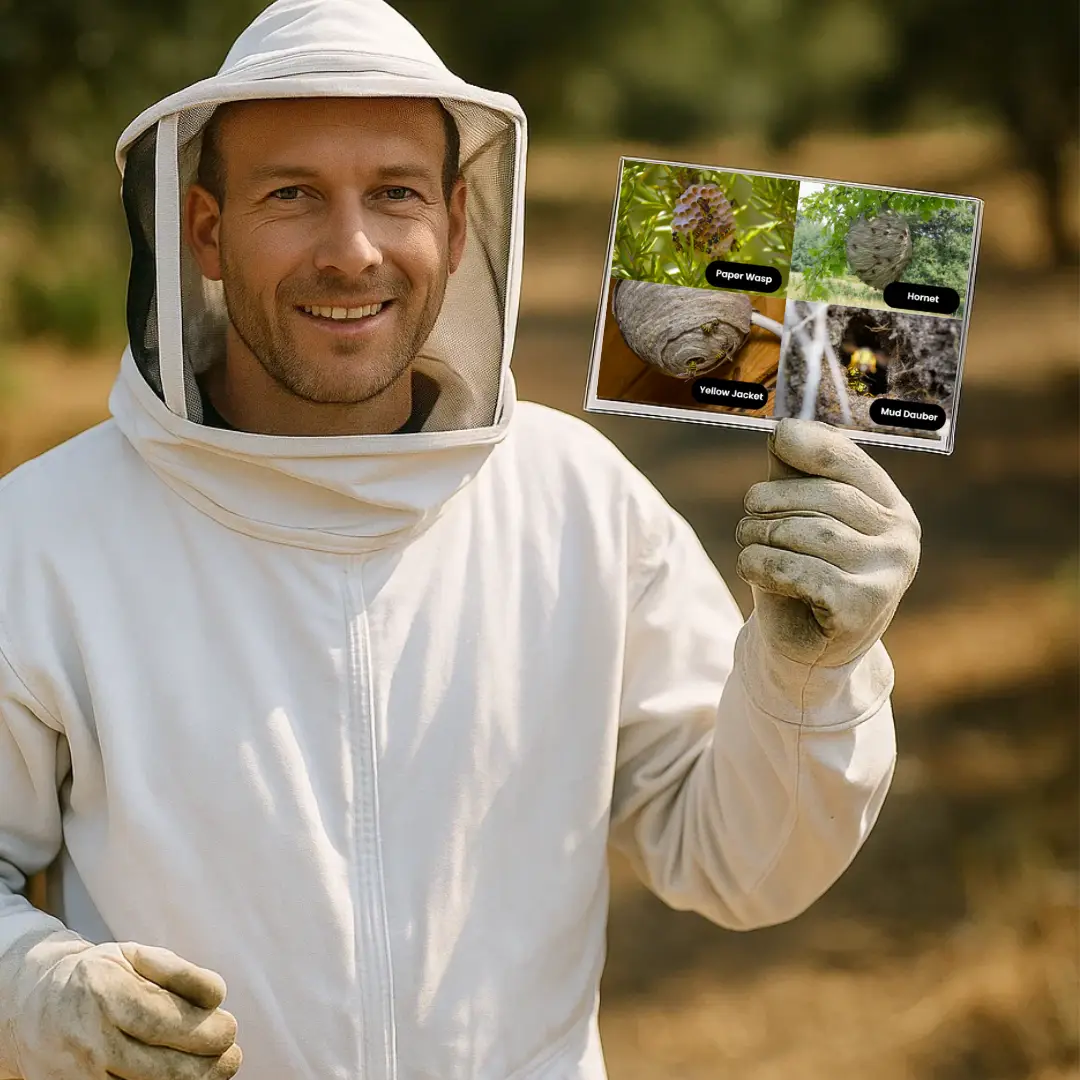Wasps Explained: A Local Resident’s Guide for Smart Action
Wasps are a normal part of any British summer, especially for those of us living in Merseyside. We often see them in gardens, parks, and sometimes even sneaking into our homes. They can feel like a nuisance when we’re trying to enjoy the sunshine, and they sometimes become aggressive, leading to stings. But when it comes to these striped insects, not all wasps are the same.
This guide will help St Helens families and Merseyside locals understand exactly which wasp species are buzzing around, what kind of nests they build, and what steps to take if they’re causing trouble on your property. Whether you’re dealing with one rogue wasp or an infestation, knowing what you’re up against can make all the difference.
At Wasps-R-Us, we deal with these insects every day, and we’re here to share our experience and knowledge so you can stay safe and worry-free.
Meet the Common Wasps
People often think all wasps look and behave the same way, but there are a few types that pop up more often in Merseyside. Each species has its own nesting habits, behaviour, and sting risk.
1. The Common Wasp (Vespula vulgaris)
The most widespread species you’ll find in St Helens and across Merseyside is the Vespula vulgaris, or Common Wasp. These are the ones that tend to ruin barbecues and chase sugary drinks. With bright yellow and black stripes, they grow to about 12–17mm in length.
They build nests underground or in wall cavities, loft spaces, and sheds. Their colonies can grow into the thousands during peak summer months. If you notice a lot of wasps buzzing in and out of a small hole near your roof or garden wall, this may be their entry point.
Aggressive when their nest is disturbed, these wasps can sting more than once. Their sting is painful but typically not dangerous unless you’re allergic.
2. German Wasp (Vespula germanica)
Very similar looking to the Common Wasp, the German Wasp is just as bold and known to sting without much warning. One of the easiest ways to tell them apart is by the black dots on their face, though we wouldn’t recommend getting close enough to check!
They also build nests in sheltered locations, often above ground, like in lofts and cavity walls. Unlike honeybees, which only sting once, German Wasps can sting multiple times before retreating.
These wasps are especially common in densely populated parts of Merseyside, like central St Helens, where buildings provide lots of great nesting spots.
3. Red Wasp (Polistes dominula)
The Red Wasp, although not as common as the other two, has become more noticeable in warmer parts of the UK recently, including areas around Southport and Liverpool.
Dating originally from southern Europe, these reddish-orange wasps are slightly slimmer and longer than the ones we’re used to. They build open, umbrella-like nests often found under eaves or in roof corners.
They are less aggressive than our British natives but will still sting if they feel threatened.
4. Tree Wasp (Dolichovespula sylvestris)
This wasp prefers the countryside and woodlands and can be found around places like Knowsley, Rainford, and Newton-le-Willows. If you’re near fields or large gardens, you might have seen one.
The Tree Wasp likes to build nests in the open, in trees, bushes, or hedgerows. They have a thin waist and a loud buzz, which makes them easy to identify.
They’re not aggressive unless the nest is disturbed, but be extra cautious because their sting is known to be more painful than those of other species.
Where Wasps Build Their Nests in St Helens and Beyond
Spotting a nest early can make it easier to get rid of one safely. The wasp species common in Merseyside tend to favour similar nesting spots.
Here are some of the common places to check:
- Loft spaces and attic corners
- Garden sheds and garages
- Wall cavities
- Under the roof tiles
- Bushes or trees
- Compost bins or underground holes
A single nest can host thousands of wasps by midsummer. That’s why it’s smart to act quickly and call a local wasp control service, like Wasps-R-Us, as soon as you spot early signs.
Why Wasps Become a Problem in Summer
In early summer, queen wasps emerge and start building nests. The first batch of worker wasps hatches soon after, and by late summer, colonies are in full swing.
At this stage, adult wasps no longer have larvae to care for, and they go on the hunt for sugary food. This is when we see the most wasps hanging around bins, patio tables, and ice cream.
They become more aggressive during this time, too, as they’re more desperate for food and easily angered. Some people get stung more than once and have serious allergic reactions. If you’re ever in doubt, don’t approach a nest on your own.

How to Spot a Wasp Nest Early
Spotting a nest early reduces the chances of it becoming a much bigger problem.
Here are the signs St Helens residents should look out for in spring and early summer:
- A regular stream of wasps was entering and exiting a hole in a wall or roof.
- Buzzing sounds are coming from behind walls or ceilings.
- Strange mushroom or paper-like structures grow in the corners of sheds or lofts.
If you think you’ve located a wasp nest, it’s better not to take risks. Professional services like https://www.waspnestremovaluk.com/ can help assess and treat the issue quickly.
How Dangerous Are Wasp Stings?
Most stings aren’t life-threatening, but they are very painful. A wasp sting can cause:
- Swelling
- Redness
- A burning or sharp pain
- Itching or tenderness afterwards
In some people, especially those with allergies, a wasp sting can bring on a more serious reaction called anaphylaxis.
It’s always safest to stay calm and move slowly if a wasp is near. Swatting at them usually only makes things worse.
Taking the Smart Approach to Wasp Removal
We know how tempting it is to try a DIY fix, especially with sprays and foam products available in local shops across Merseyside. But if you’re not trained or wearing protective gear, you risk multiple stings and further aggravating the colony.
Our team at Wasps-R-Us recommends calling in professionals instead. At Wasps-R-Us, we use safe treatments that are quick, humane, and suitable for families and pets.
We often get same-day bookings in St Helens and nearby areas, and we’re always happy to offer advice over the phone too.
FAQs
How long do wasp nests last?
Most nests only last one summer. The queens leave late in the season, and the workers die off. Nests are never reused, but new ones can pop up near old sites.
Can I block the hole to keep them out?
Blocking an active nest opening can trap live wasps, making them aggressive. They may find another way out, even into your house. Always deal with the nest first.
Were wasps useful for anything?
Surprisingly, yes. They eat garden pests like caterpillars and flies. But when they get too close to people, they turn from helpful to harmful.
How quickly can you remove a nest?
Most nest removals take under an hour. In many St Helens homes, we’re done in 30 minutes. Call Wasps-R-Us for same-day visits.
Does killing the queen stop the nest?
If the queen is removed or killed early in the season, then yes, the colony won’t grow. But that’s nearly impossible without disturbing the nest, which is risky.
Stay Safe from Wasps in St Helens: Spot the Signs, Act Fast, and Enjoy Your Summer
Wasps are here to stay, but you don’t have to live in fear of them. Whether it’s learning to spot different species, understanding their nesting habits, or knowing who to call when they get too close, a bit of knowledge goes a long way.
The next time you see one buzzing about in St Helens or elsewhere in Merseyside, take a second to look calmly. If there are more than a couple of wasps or signs of a nest, reach out to Wasps-R-Us, and we’ll take care of the problem quickly and safely.
Protect your home and keep summer fun by dealing with wasps the smart way. Call us today or visit our website to book a nest inspection or get free advice.



 Blog
Blog